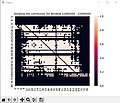Cosegregation
Cosegregation is a term used in genetics to describe the simultaneous transmission of two or more genetic markers from a parent to an offspring. This process is often used in genetic studies to determine the likelihood that two markers are located near each other on the same chromosome.
Overview[edit]
In genetics, cosegregation refers to the tendency of genetic markers, such as single nucleotide polymorphisms (SNPs), to be inherited together because they are located near each other on the same chromosome. This is a fundamental concept in the field of genetic linkage analysis, which is used to map the location of genes on chromosomes.
Cosegregation is often used in genetic studies to determine the likelihood that two markers are located near each other on the same chromosome. This can be particularly useful in the study of genetic diseases, as it can help to identify the genes that are responsible for these conditions.
Genetic Linkage[edit]
Genetic linkage is the principle that genes located close together on the same chromosome tend to be inherited together. This is due to the fact that during meiosis, the process of cell division that produces gametes, chromosomes are broken and recombined in a process known as crossing over. The closer two genes are to each other on the chromosome, the less likely they are to be separated during crossing over, and thus the more likely they are to be inherited together.
Cosegregation in Genetic Studies[edit]
In genetic studies, cosegregation analysis is often used to determine the likelihood that two genetic markers are located near each other on the same chromosome. This is done by studying the inheritance patterns of these markers in families with a history of a particular genetic disease. If the markers are found to cosegregate with the disease in these families, this suggests that they are located near the gene that causes the disease on the chromosome.
See Also[edit]
References[edit]
<references />
Ad. Transform your life with W8MD's Budget GLP-1 injections from $75


W8MD offers a medical weight loss program to lose weight in Philadelphia. Our physician-supervised medical weight loss provides:
- Weight loss injections in NYC (generic and brand names):
- Zepbound / Mounjaro, Wegovy / Ozempic, Saxenda
- Most insurances accepted or discounted self-pay rates. We will obtain insurance prior authorizations if needed.
- Generic GLP1 weight loss injections from $75 for the starting dose.
- Also offer prescription weight loss medications including Phentermine, Qsymia, Diethylpropion, Contrave etc.
NYC weight loss doctor appointmentsNYC weight loss doctor appointments
Start your NYC weight loss journey today at our NYC medical weight loss and Philadelphia medical weight loss clinics.
- Call 718-946-5500 to lose weight in NYC or for medical weight loss in Philadelphia 215-676-2334.
- Tags:NYC medical weight loss, Philadelphia lose weight Zepbound NYC, Budget GLP1 weight loss injections, Wegovy Philadelphia, Wegovy NYC, Philadelphia medical weight loss, Brookly weight loss and Wegovy NYC
|
WikiMD's Wellness Encyclopedia |
| Let Food Be Thy Medicine Medicine Thy Food - Hippocrates |
Medical Disclaimer: WikiMD is not a substitute for professional medical advice. The information on WikiMD is provided as an information resource only, may be incorrect, outdated or misleading, and is not to be used or relied on for any diagnostic or treatment purposes. Please consult your health care provider before making any healthcare decisions or for guidance about a specific medical condition. WikiMD expressly disclaims responsibility, and shall have no liability, for any damages, loss, injury, or liability whatsoever suffered as a result of your reliance on the information contained in this site. By visiting this site you agree to the foregoing terms and conditions, which may from time to time be changed or supplemented by WikiMD. If you do not agree to the foregoing terms and conditions, you should not enter or use this site. See full disclaimer.
Credits:Most images are courtesy of Wikimedia commons, and templates, categories Wikipedia, licensed under CC BY SA or similar.
Translate this page: - East Asian
中文,
日本,
한국어,
South Asian
हिन्दी,
தமிழ்,
తెలుగు,
Urdu,
ಕನ್ನಡ,
Southeast Asian
Indonesian,
Vietnamese,
Thai,
မြန်မာဘာသာ,
বাংলা
European
español,
Deutsch,
français,
Greek,
português do Brasil,
polski,
română,
русский,
Nederlands,
norsk,
svenska,
suomi,
Italian
Middle Eastern & African
عربى,
Turkish,
Persian,
Hebrew,
Afrikaans,
isiZulu,
Kiswahili,
Other
Bulgarian,
Hungarian,
Czech,
Swedish,
മലയാളം,
मराठी,
ਪੰਜਾਬੀ,
ગુજરાતી,
Portuguese,
Ukrainian






